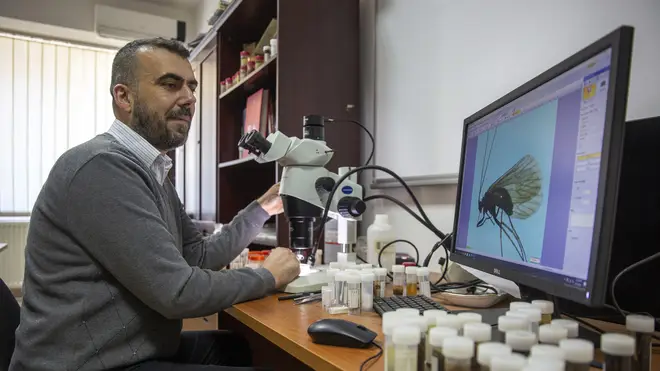
Lewis Goodall 10am - 12pm
20 April 2021, 10:54

Restrictions during the coronavirus pandemic helped Professor Halil Ibrahimi sit down and complete his research.
Restrictions during the coronavirus pandemic have helped a Kosovar biologist sit down and complete his research, raise public awareness of the pollution of river basins – and name a new insect after the virus.
Professor Halil Ibrahimi, 44, had spent years working on a research report on a caddisfly species found in Kosovo’s western Bjeshket e Nemuna (Accursed Mountains) national park.
That species now bears the name Potamophylax coronavirus.
As an associate professor of the Natural Sciences Faculty at Pristina University, Prof Ibrahimi collected the species, which turned out to be endemic to the national park, 120 kilometres (75 miles) west of the capital Pristina, and found it was quite different from the other species in the Balkans.

It is considerably smaller, and lives in a different habitat, in open, high-altitude zones, some 2,000 metres (6,500ft) above sea level.
He announced the new name he had chosen for the species in a scientific magazine this month.
“Coronavirus was the most vivid thing during the time when the species was discovered,” Prof Ibrahimi said.
During his research, he also noticed that the Lumbardhi i Decanit River, where the new species was found, has severely deteriorated over recent years due to the construction of a hydropower plant.
Kosovo and the Balkan countries have a long history of environmental pollution of all kinds, from sewage water pumped directly into rivers to deforestation and mismanagement of hydropower plants.

“It has the same effect on the species living in the rivers as the coronavirus is causing to humankind these days,” Prof Ibrahimi said.
The overall environmental situation in Kosovo has worsened over recent years, with increased construction, traffic and industrial pollution, as well as the government’s efforts to promote small hydropower plants as an alternative energy source.
“Uncontrolled use of water resources and damage to river beds still remains one of the forms of degradation of our water resources,” according to a report on Kosovo’s environment published last year.
People should “rethink their attitude towards the environment” because these insects are “the first barrier before the pollution comes to the humans”, Prof Ibrahimi said.

“They are the first indicators that something is going wrong in the environment … in order to be prepared for the pollution impacting directly on ourselves.”
Now that the virus and the insect are forever linked via the name, “the institutions must undertake measures to stop this degradation to the environment, and people must start considering these insect species as part of their own life”, Prof Ibrahimi said.